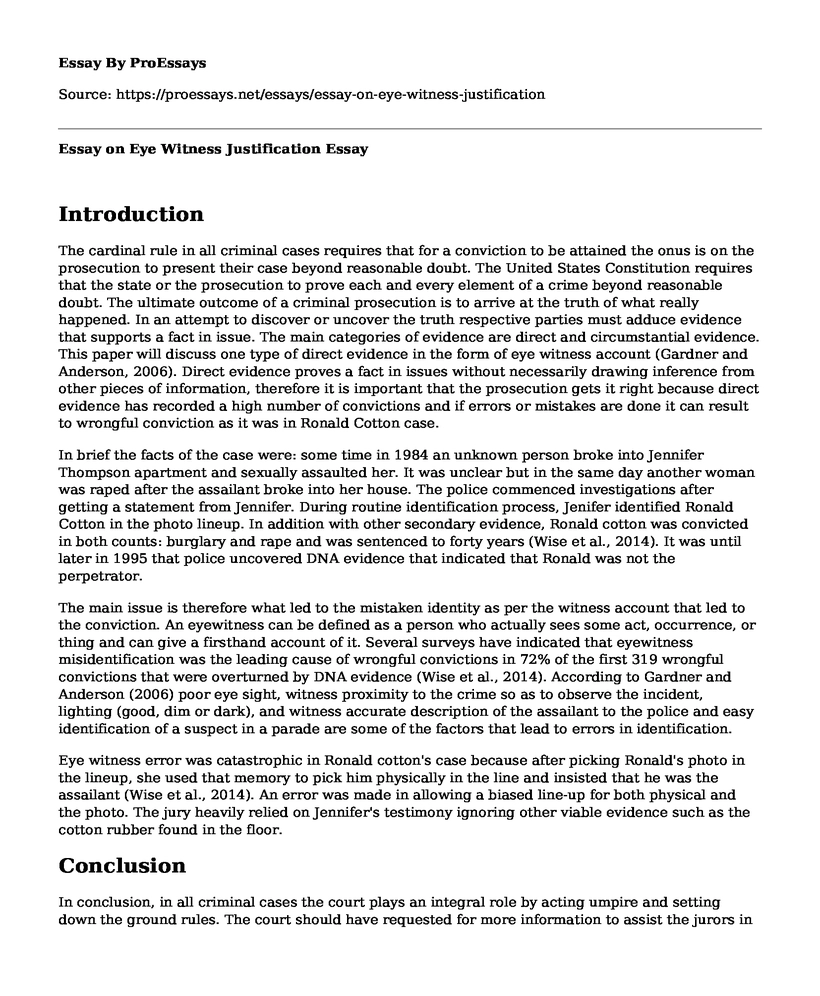Introduction
The cardinal rule in all criminal cases requires that for a conviction to be attained the onus is on the prosecution to present their case beyond reasonable doubt. The United States Constitution requires that the state or the prosecution to prove each and every element of a crime beyond reasonable doubt. The ultimate outcome of a criminal prosecution is to arrive at the truth of what really happened. In an attempt to discover or uncover the truth respective parties must adduce evidence that supports a fact in issue. The main categories of evidence are direct and circumstantial evidence. This paper will discuss one type of direct evidence in the form of eye witness account (Gardner and Anderson, 2006). Direct evidence proves a fact in issues without necessarily drawing inference from other pieces of information, therefore it is important that the prosecution gets it right because direct evidence has recorded a high number of convictions and if errors or mistakes are done it can result to wrongful conviction as it was in Ronald Cotton case.
In brief the facts of the case were: some time in 1984 an unknown person broke into Jennifer Thompson apartment and sexually assaulted her. It was unclear but in the same day another woman was raped after the assailant broke into her house. The police commenced investigations after getting a statement from Jennifer. During routine identification process, Jenifer identified Ronald Cotton in the photo lineup. In addition with other secondary evidence, Ronald cotton was convicted in both counts: burglary and rape and was sentenced to forty years (Wise et al., 2014). It was until later in 1995 that police uncovered DNA evidence that indicated that Ronald was not the perpetrator.
The main issue is therefore what led to the mistaken identity as per the witness account that led to the conviction. An eyewitness can be defined as a person who actually sees some act, occurrence, or thing and can give a firsthand account of it. Several surveys have indicated that eyewitness misidentification was the leading cause of wrongful convictions in 72% of the first 319 wrongful convictions that were overturned by DNA evidence (Wise et al., 2014). According to Gardner and Anderson (2006) poor eye sight, witness proximity to the crime so as to observe the incident, lighting (good, dim or dark), and witness accurate description of the assailant to the police and easy identification of a suspect in a parade are some of the factors that lead to errors in identification.
Eye witness error was catastrophic in Ronald cotton's case because after picking Ronald's photo in the lineup, she used that memory to pick him physically in the line and insisted that he was the assailant (Wise et al., 2014). An error was made in allowing a biased line-up for both physical and the photo. The jury heavily relied on Jennifer's testimony ignoring other viable evidence such as the cotton rubber found in the floor.
Conclusion
In conclusion, in all criminal cases the court plays an integral role by acting umpire and setting down the ground rules. The court should have requested for more information to assist the jurors in reaching a decision. The process of identifying a suspect is crucial in all criminal cases save for case of recognition thus it is important that identification be done in an orderly manner that conforms to the legal procedures to avoid critical errors as it was in Ronald Cotton case.
References
Gardner, T.J and Anderson, T.M. (2006). Criminal Evidence: Principles and Cases. ISBN-10: 1111838038. Pp 80-111.
Wise, R. A., Sartori, G., Magnussen, S., & Safer, M. A. (2014). An Examination of the Causes and Solutions to Eyewitness Error. Frontiers in Psychiatry, 5, 102. http://doi.org/10.3389/fpsyt.2014.00102
Cite this page
Essay on Eye Witness Justification. (2022, Jun 02). Retrieved from https://proessays.net/essays/essay-on-eye-witness-justification
If you are the original author of this essay and no longer wish to have it published on the ProEssays website, please click below to request its removal:
- Strict Product Liability: Calles v. Scripto-Tokai Corp. Case Paper Example
- Essay Sample on The Relationship between Crime and Immigration
- Current Events Which Are Happening in Line With the 8th Amendment in the USA
- O.J. Simpson Murder Case: Trial, Dream Team & Confusion - Essay Sample
- Dark Web: Exploring the Impact of De-Anonymizing - Essay Sample
- Essay on Digital Forensics: Protections Against Unlawful Search & Retrieval
- Miranda v Arizona: Suspects Must be Informed of Rights - Case Study







